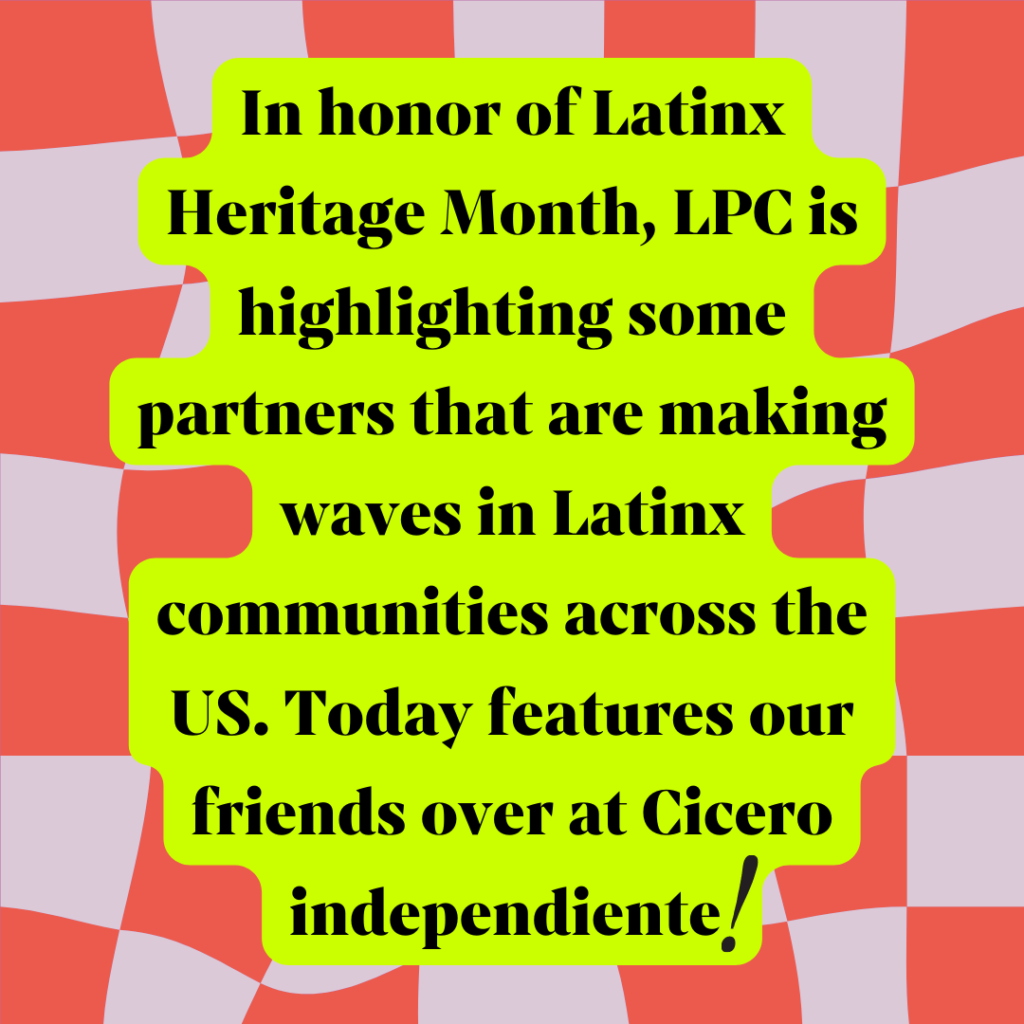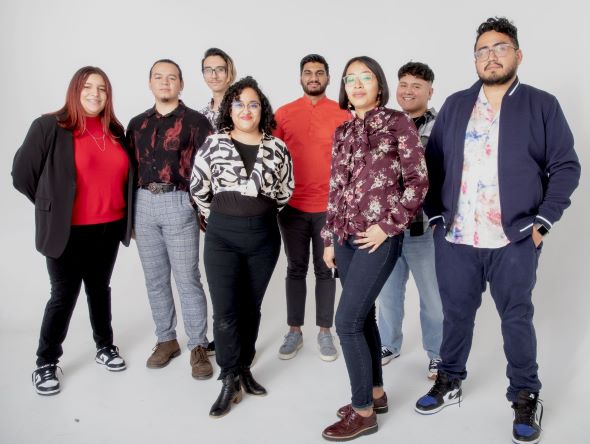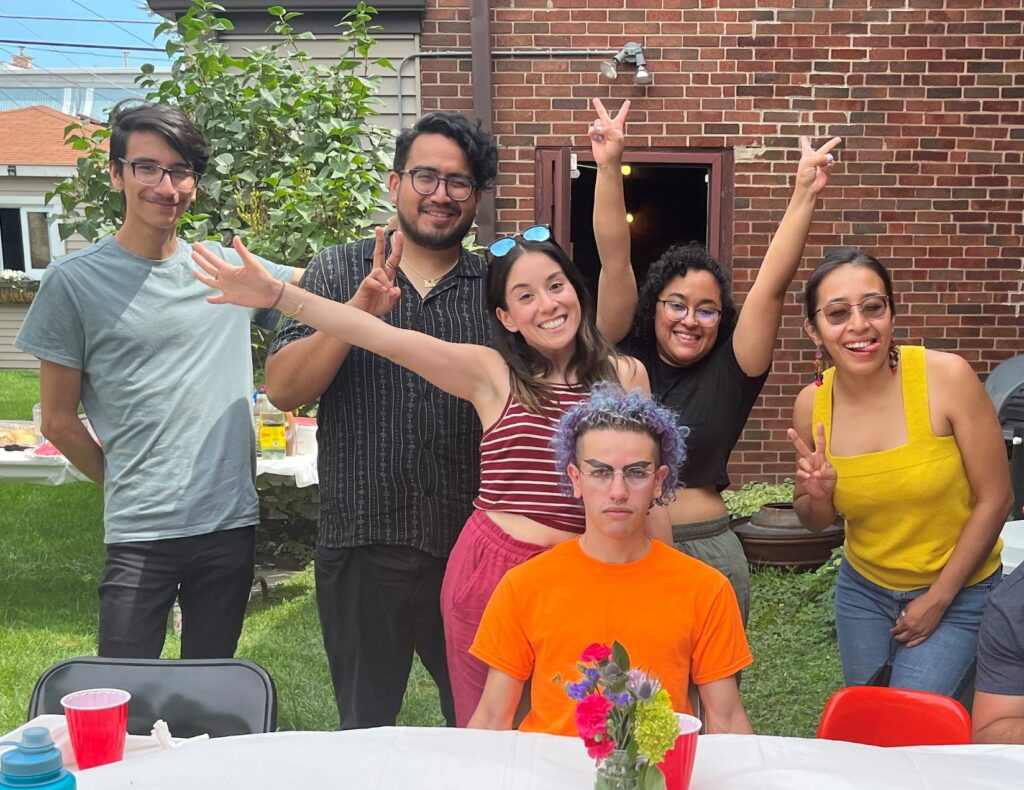By Silvia Rivera

As Senior Business Strategist for the Listening Post Collective, I have the honor of working with civic media partners across the country. In celebration of Latinx heritage month, we’ve decided to put the spotlight on a partner that is very close to home to me, Cicero Independiente.
Cicero Independiente is an independent, bilingual news organization serving the people of Cicero and Berwyn, Illinois.
Now, I don’t play favorites, but I have to say that I have a soft spot for the work that April Alonso and Irene Romulo are doing as young Latina media leaders. Irene and April are two of three co-founders of this fantastic news and information outlet, and I had the chance to speak with them recently about the work they are doing in service of their community.
Speaking to them reminded me a lot of the fulfillment I found leading Radio Arte, a radio station and training program that unabashedly served the Latinx community on the Southwest Side of Chicago, including Cicero/Berwyn; it also reminded me that some of the challenges of yesteryear remain true. The fight for Latinx representation in the media still needs to be fought.
Radio Arte ceased to exist many years ago. Still, its legacy endures in the graduates of its training programs and the community that benefited from its programming. Talking to Irene and April reminded me that leaders will rise to the moment in the face of gaping community needs, and our community couldn’t be in better hands. The future that they are building is a bright one.

April Alonso (Front Row, Black and White)Irene Romulo (Front Row, Purple) with reporting fellows and steering committee. Photo by Jesus J Montero.
This interview was edited for brevity and clarity.
Silvia Rivera
You launched in 2019 and have been working relentlessly to serve the Latinx community in Cicero – what are some of the things that you have learned about serving your community over the past few years. Any specific challenges, successes, or things that have surprised you?
April Alonso
What I have learned is that people do want to get involved. A lot of people here in Cicero feel disconnected from community. For me growing up it felt like no one gets involved, no one knows each other. But no, that’s not true. A lot of people want to get involved. If the opportunities are there, a lot of people will join together. What I see in our fellowships, since there are some señores/as, is that they have the idea that standing together in solidarity and being together in numbers brings them a lot of strength.
Irene Romulo
For me, a lot of what fueled me in the beginning was anger at seeing how different people with institutional power, abuse their power. As an organizer filming interactions with ICE in Cicero, how police would lie about their collaboration with ICE, I was angry about that. I was angry at seeing how people were kept out of decisions that were impacting their everyday life.
I’m still angry, but that doesn’t necessarily guide me. Being involved in Cicero Independiente is really about me wanting the people who live here to have a better future and to really highlight all of the different talents, gifts, and knowledge that people have.
The desire for me to do more of this has really grown these past two years. And specifically being Latina, and being Mexican..it was actually a funder who pointed this out to us… and it kind of made me want to tear up when she like talked about it, about how our parents came here for whatever reason…like wanting a better future, like different opportunities.. and how we’re really taking up space here and making sure that we are growing our roots in a space that our parents decided to come to.. and how we’re making the space our own, not just for ourselves now, but for the future.
And that is very special to me, that we’re taking up this space, and really highlighting all the diversity within the Latino community.
Silvia Rivera
I wonder how you feel about the media landscape. What are your thoughts on how mainstream media serves our communities? Do you feel like it needs to be transformed? Or does Latinx media need to be built from the ground up?
April Alonso
When we first started, it was like, let’s just do it ourselves, we all had our different experiences with mainstream media, but the same common idea that we didn’t like how the relationship was between our communities and mainstream media. We had this idea of let’s change the media ourselves, in the way that we want to see it, and how we think it will be more beneficial than harmful. And, for me, I don’t like the way mainstream media cover us. They come in just to get their scoop, like during the unrest, or when there was the Willie Wilson gas giveaway.
There’s no relationship building between mainstream media and like communities of color, especially like the Latino community Cicero. They should build connections with the people that they’re highlighting to make it more about them, and not to get like views or clicks online.
But ultimately, I think the ways that things are modeled, they [mainstream media] always end up in not giving people who want to change things enough resources, time, and power to make sure that they’re spending time building relationships, or that they’re doing things that are useful to the people that they’re reporting on. – Irene Romulo
Irene Romulo
I think we definitely need a complete transformation of how things are. But there’s a role that people can play within like mainstream media to make sure that there’s harm reduction and lessening the harms that are done. But ultimately, I think the ways that things are modeled, they [mainstream media] always end up in not giving people who want to change things enough resources, time, and power to make sure that they’re spending time building relationships, or that they’re doing things that are useful to the people that they’re reporting on. It’s all about DEI. But ultimately, they really don’t know what that means. Like why are they doing this? Who is this about? For them that might mean adding more people of color, for diversity, but those people aren’t given the power to change things or the support that they need. This doesn’t change power dynamics or the relationships that newsrooms have with communities.
Silvia Rivera
That is so real. As Latinas, and relatively new media leaders, how have you navigated being in spaces where you’re probably among the few or only?
April Alonso
I think since the beginning, we’ve been strategic on who we are collaborating with, who we’re talking to, and the spaces we’re in. We’ve surrounded ourselves with people of color, women identifying people and have found support. We couldn’t do it without other people’s support and giving that support back too.
Irene Romulo
And in our community, I think it’s been very helpful and useful for us to remember who this work is for and who it’s not for.
There are people here like officials, or people in power, that ignore us, or think less of us because of who we are. But it’s also people in the community, and often white people who live here, and who criticize us.
We could let that make us feel bad, or hamper us, or make us waste time trying to prove ourselves to them. But we don’t have to because our work is not for them.
For people like elected officials, or a comms person who we need to get comments from, and who initially ignored us…our work is enough to show them that they do need to take us seriously…I don’t need to waste my time trying to be friends or try to get on their good side so that they can comment because it’s really a disservice to them to when they don’t.
Silvia Rivera
You’ve been able to rally a lot of people to support your work and get some important funding to do so. What are some of the things you’ve learned about navigating funder relationships? What have been some challenges?
April Alonso
What I appreciate about good funding relationships is where it doesn’t feel like we have to sell our work to make it look good. Like we can be ourselves and talk about what we’re dealing with, what we’re facing, what we’re excited about, and where we are. Where we can just be ourselves.
On one call I was on, I shouted out for Irene on accident, and I was like ‘oh God, they are going to think that was unprofessional. But the funder laughed and said, ‘I’m like that too’. Not having to code switch is great.
Irene Romulo
Thankfully we haven’t had to prove that what we do is important. I think that the funders, or the people that we have spoken to, understand our work and get it.
We’re able to really highlight the importance of having news that’s produced by people from a community.
What I see often as a challenge is that it’s hard to experiment and try to be creative and try new things, which is needed, especially when there’s been so much harm caused by the way that traditional media has covered communities.
It’s hard to do that when you are limited by imposed on deadlines. It’s hard to try something new when you need to show that it worked right away or show that there was some growth after like 12 months, when oftentimes, like things take a while to work.
Yes, we want to grow. We want to make sure more people are getting our news and are being informed and participating in our programs. But like, I think it’s equally, if not more important, to make sure that we’re going deep to and like making sure that our relationships are strong and long lasting, and that we can collaborate with people and build that trust. And that is what takes time.
It’s hard to do that when you need to report on progress a year later or worry about a funder being okay with you only publishing like 20 stories a year and that they’ll fund you the next year.
What’s helpful, with at least one of our funders, is that they told us that they would let us know at least a year in advance whether they’re going to stop funding us and they expect to fund organizations for at least three to five years, which you know, like ideally it would be longer, but at least they know how we work and know to give us a heads up. That’s a weight off my shoulders because at least I know what to expect.
Silvia Rivera
What would be a transformational investment for you? What would give you the foundation to do all the creative experimentation or the things that you want to do?
Irene Romulo
We’ve been able to do, and this is not to say that we should work our asses off with little money, but we’ve been able to do a lot with the little money that we have. Like we’re working on a little less than a 250k budget. I would say that if we had 400k for the next four years, while we work on other funding too, that would be so great!
Silvia Rivera
This is a side note, and I’ve been there, when you’re so hungry to do the work, and you do so at all hours, because you’re passionate about the mission, and serving your community, you put yourself second. Sometimes it’s just to prove that point that you can do so much with so little. Like let me show you what I can do. Part of what I had to learn over time, was like no, you need to give me the money I need to do this work right. You can’t give me 50k to do something you’re giving someone else a $1m for.
Irene Romulo
I don’t want to speak for you both. But like, for me, I think that’s also comes from where I come from and who my parents are. And being in a community where people have to work so much all the time just to survive. And feeling a little bit of guilt about it. Like if other people are doing it then we should be too because there’s so much work that we need to do and like people need to know about everything that’s going on.
Silvia Rivera
I agree. It’s culturally hard-wired, it’s where a lot of my hustle came from too, like, what do you mean it can’t be done? Let me show you.
So tell me, how would you define success for Cicero Independiente? What would it take to elevate Latinx representation in the media?
If we are able to share the lived experiences of people, and the diversity between our own communities, I think we will continue being successful. And we should keep changing as it goes, and change with people as their needs change, so that they always feel reflected in their community. -April Alonso
April Alonso
[In Cicero] Since a lot of the Latinx community isn’t represented, or they aren’t reflected at all in local government and in the town, we need to make sure we continue to reflect them. If we are able to share the lived experiences of people, and the diversity between our own communities, I think we will continue being successful. And we should keep changing as it goes, and change with people as their needs change, so that they always feel reflected in their community.
Irene Romulo
As for the media, media needs to do a lot more listening, and be less afraid to hold people with power accountable for the sake of being objective. Because I think like, sure, we can add more Latinos in news or Latinos in the newsroom. But also, who those Latinos are matters, right? Like not just their race and ethnic identity too. But like, where they come from and the perspectives that they have, because there’s a big difference between having a white Latina, conservative, leading Univision, than someone who is not white, who has darker skin, or who is a Black Latina, and who is willing to really amplify the perspectives people who are the most impacted by injustice, and not just give a platform to people with power or institutions. We need to consider all of these things, like, what does it mean to be Latina in these positions, and do a lot more listening and empowering of people.
Silvia Rivera
Thank you, ladies. It was really energizing to talk to you.
Click here to support the work that Cicero Independiente is doing!

Courtesy of Cicero Independiente

